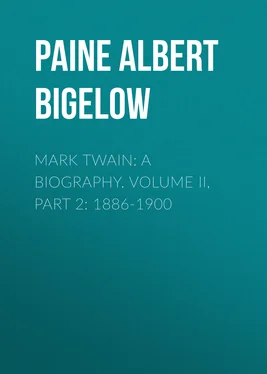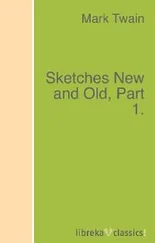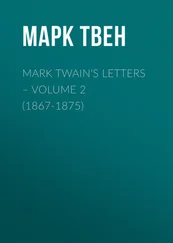Albert Paine - Mark Twain - A Biography. Volume II, Part 2 - 1886-1900
Здесь есть возможность читать онлайн «Albert Paine - Mark Twain - A Biography. Volume II, Part 2 - 1886-1900» — ознакомительный отрывок электронной книги совершенно бесплатно, а после прочтения отрывка купить полную версию. В некоторых случаях можно слушать аудио, скачать через торрент в формате fb2 и присутствует краткое содержание. Жанр: Биографии и Мемуары, foreign_antique, на английском языке. Описание произведения, (предисловие) а так же отзывы посетителей доступны на портале библиотеки ЛибКат.
- Название:Mark Twain: A Biography. Volume II, Part 2: 1886-1900
- Автор:
- Жанр:
- Год:неизвестен
- ISBN:нет данных
- Рейтинг книги:4 / 5. Голосов: 1
-
Избранное:Добавить в избранное
- Отзывы:
-
Ваша оценка:
- 80
- 1
- 2
- 3
- 4
- 5
Mark Twain: A Biography. Volume II, Part 2: 1886-1900: краткое содержание, описание и аннотация
Предлагаем к чтению аннотацию, описание, краткое содержание или предисловие (зависит от того, что написал сам автор книги «Mark Twain: A Biography. Volume II, Part 2: 1886-1900»). Если вы не нашли необходимую информацию о книге — напишите в комментариях, мы постараемся отыскать её.
Mark Twain: A Biography. Volume II, Part 2: 1886-1900 — читать онлайн ознакомительный отрывок
Ниже представлен текст книги, разбитый по страницам. Система сохранения места последней прочитанной страницы, позволяет с удобством читать онлайн бесплатно книгу «Mark Twain: A Biography. Volume II, Part 2: 1886-1900», без необходимости каждый раз заново искать на чём Вы остановились. Поставьте закладку, и сможете в любой момент перейти на страницу, на которой закончили чтение.
Интервал:
Закладка:
"Mr. Beard, I do not want to subject you to any undue suffering, but I wish you would read the book before you make the pictures."
Beard replied that he had already read it twice.
"Very good," Clemens said; "but I wasn't led to suppose that that was the usual custom among illustrators, judging from some results I have seen. You know," he went on, "this Yankee of mine has neither the refinement nor the weakness of a college education; he is a perfect ignoramus; he is boss of a machine shop; he can build a locomotive or a Colt's revolver, he can put up and run a telegraph line, but he's an ignoramus, nevertheless. I am not going to tell you what to draw. If a man comes to me and says, 'Mr. Clemens, I want you to write me a story,' I'll write it for him; but if he undertakes to tell me what to write I'll say, 'Go hire a typewriter.'"
To Hall a few days later he wrote:
Tell Beard to obey his own inspirations, and when he sees a picture in his mind put that picture on paper, be it humorous or be it serious. I want his genius to be wholly unhampered. I sha'n't have any fear as to results.
Without going further it is proper to say here that the pictures in the first edition of A Connecticut Yankee in King Arthur's Court justified the author's faith in the artist of his selection. They are far and away Dan Beard's best work. The socialism of the text strongly appealed to him. Beard himself had socialistic tendencies, and the work inspired him to his highest flights of fancy and to the acme of his technic. Clemens examined the pictures from time to time, and once was moved to write:
My pleasure in them is as strong and as fresh as ever. I do not know of any quality they lack. Grace, dignity, poetry, spirit, imagination, these enrich them and make them charming and beautiful; and wherever humor appears it is high and fine—easy, unforced, kept under, masterly, and delicious.
He went on to describe his appreciation in detail, and when the drawings were complete he wrote again:
Hold me under permanent obligations. What luck it was to find you! There are hundreds of artists who could illustrate any other book of mine, but there was only one who could illustrate this one. Yes, it was a fortunate hour that I went netting for lightning-bugs and caught a meteor. Live forever!
This was not too much praise. Beard realized the last shade of the author's allegorical intent and portrayed it with a hundred accents which the average reader would otherwise be likely to miss.
Clemens submitted his manuscript to Howells and to Stedman, and he read portions of it, at least, to Mrs. Clemens, whose eyes were troubling her so that she could not read for herself. Stedman suggested certain eliminations, but, on the whole, would seem to have approved of the book. Howells was enthusiastic. It appealed to him as it had appealed to Beard. Its sociology and its socialism seemed to him the final word that could be said on those subjects. When he had partly finished it he wrote:
It's a mighty great book and it makes my heart, burn with wrath. It seems that God didn't forget to put a soul in you. He shuts most literary men off with a brain, merely.
A few days later he wrote again:
The book is glorious-simply noble. What masses of virgin truth never touched in print before!
And when he had finished it:
Last night I read your last chapter. As Stedman says of the whole book, it's titanic.
Clemens declared, in one of his replies to Howells:
I'm not writing for those parties who miscall themselves critics, and I don't care to have them paw the book at all. It's my swan song, my retirement from literature permanently, and I wish to pass to the cemetery unclodded . . . . Well, my book is written—let it go, but if it were only to write over again there wouldn't be so many things left out. They burn in me; they keep multiplying and multiplying, but now they can't ever be said; and besides they would require a library—and a pen warmed up in hell.
In another letter of this time to Sylvester Baxter, apropos of the tumbling Brazilian throne, he wrote:
When our great brethren, the disenslaved Brazilians, frame their declaration of independence I hope they will insert this missing link: "We hold these truths to be self-evident—that all monarchs are usurpers and descendants of usurpers, for the reason that no throne was ever set up in this world by the will, freely exercised, of the only body possessing the legitimate right to set it up—the numerical mass of the nation."
He was full of it, as he had been all along, and 'A Connecticut Yankee in King Arthur's Court' is nothing less than a brief for human rights and human privileges. That is what it is, and it is a pity that it should be more than that. It is a pity that he should have been beset by his old demon of the burlesque, and that no one should have had the wisdom or the strength to bring it under control.
There is nothing more charming in any of Mark Twain's work than his introductory chapter, nothing more delightful than the armoring of the Yankee and the outset and the wandering with Alisande. There is nothing more powerful or inspiring than his splendid panoramic picture—of the King learning mercy through his own degradation, his daily intercourse with a band of manacled slaves; nothing more fiercely moving than that fearful incident of the woman burned to warm those freezing chattels, or than the great gallows scene, where the priest speaks for the young mother about to pay the death penalty for having stolen a halfpenny's worth, that her baby might have bread. Such things as these must save the book from oblivion; but alas! its greater appeal is marred almost to ruin by coarse and extravagant burlesque, which destroys illusion and antagonizes the reader often at the very moment when the tale should fill him with a holy fire of a righteous wrath against wrong. As an example of Mark Twain at his literary worst and best the Yankee ranks supreme. It is unnecessary to quote examples; one cannot pick up the volume and read ten pages of it, or five pages, without finding them. In the midst of some exalted passage, some towering sublimity, you are brought suddenly to earth with a phrase which wholly destroys the illusion and the diviner purpose. Howells must have observed these things, or was he so dazzled by the splendor of its intent, its righteous charge upon the ranks of oppression, that he regarded its offenses against art as unimportant. This is hard to explain, for the very thing that would sustain such a great message and make it permanent would be the care, the restraint, the artistic worthiness of its construction. One must believe in a story like that to be convinced of its logic. To lose faith in it—in its narrative—is absolutely fatal to its purpose. The Yankee in King Arthur's Court not only offended the English nation, but much of it offended the better taste of Mark Twain's own countrymen, and in time it must have offended even Mark Twain himself. Reading it, one can visualize the author as a careering charger, with a bit in his teeth, trampling the poetry and the tradition of the romantic days, the very things which he himself in his happier moods cared for most. Howells likened him to Cervantes, laughing Spain's chivalry away. The comparison was hardly justified. It was proper enough to laugh chivalry out of court when it was a reality; but Mark Twain, who loved Sir Thomas Malory to the end of his days, the beauty and poetry of his chronicles; who had written 'The Prince and the Pauper', and would one day write that divine tale of the 'Maid of Orleans'; who was himself no more nor less than a knight always ready to redress wrong, would seem to have been the last person to wish to laugh it out of romance.
And yet, when all is said, one may still agree with Howells in ranking the Yankee among Mark Twain's highest achievements in the way of "a greatly imagined and symmetrically developed tale." It is of that class, beyond doubt. Howells goes further:
Читать дальшеИнтервал:
Закладка:
Похожие книги на «Mark Twain: A Biography. Volume II, Part 2: 1886-1900»
Представляем Вашему вниманию похожие книги на «Mark Twain: A Biography. Volume II, Part 2: 1886-1900» списком для выбора. Мы отобрали схожую по названию и смыслу литературу в надежде предоставить читателям больше вариантов отыскать новые, интересные, ещё непрочитанные произведения.
Обсуждение, отзывы о книге «Mark Twain: A Biography. Volume II, Part 2: 1886-1900» и просто собственные мнения читателей. Оставьте ваши комментарии, напишите, что Вы думаете о произведении, его смысле или главных героях. Укажите что конкретно понравилось, а что нет, и почему Вы так считаете.












